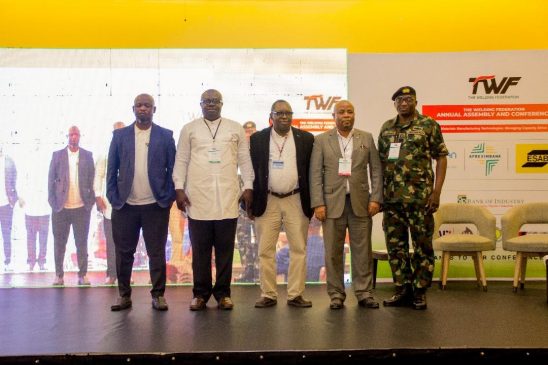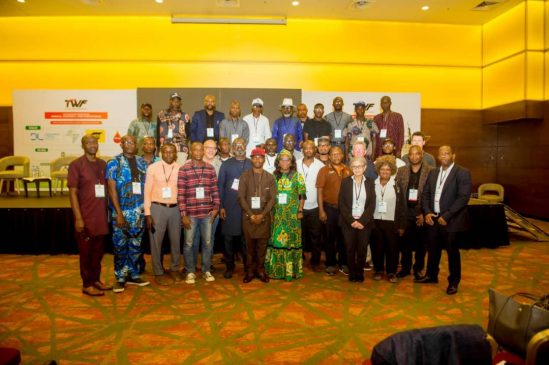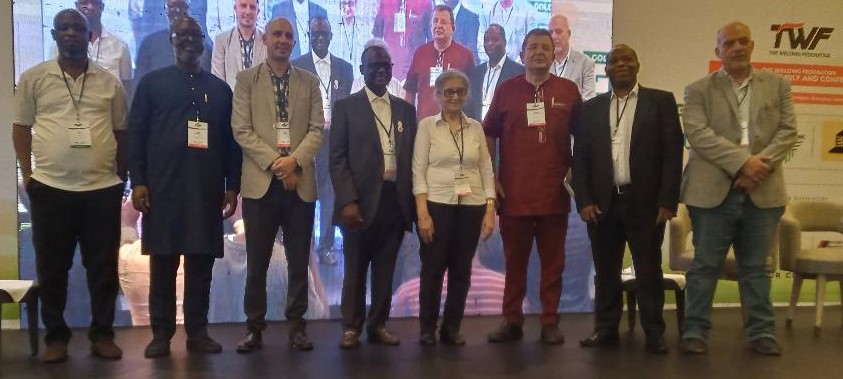By Emeka Ugwuanyi
To boost capacity and retain value creation in-country among member African countries, The Welding Federation (TWF) held its 2nd Annual Assembly and International Conference in Lagos, which drew eggheads in the welding industry and academia, among others from across the continent to brainstorm, chart ways and proffer solutions on how African countries can take the driving seat in their respective welding industries.
Top level representation from Oil and Gas Trainers Association of Nigeria (OGTAN), Petroleum Technology Association of Nigeria (PETAN), Scientific.Net, CWB Group, twfas, Material manufacturers (steel and non-steel), Construction companies, Engineering Asset Owners, Research and Technology bodies , Original Equipment Manufacturers (OEMs), Engineering consulting bodies, Members of the Academic community, among others graced the event.
The conference, which held between March 5 and 8, 2023, had in attendance representatives from South Africa, Ethiopia, Ghana, Cameroon, Senegal, Zimbabwe, Uganda, Liberia, Morocco, Mozambique, among others as well as representatives from non-African countries such as United Kingdom, Germany, Italy, Spain and Dubai, was a huge success. The cross-fertilisation of ideas was topnotch as countries shared their peculiar experiences and how they overcame some challenges.
Giving insight into what TWF is and how the conference success was achieved, Executive Director of The Welding Federation, Mr. Ayo Adeniyi, stated that TWF is a pan Africa body focused on domiciling and domesticating solutions to welding and material manufacturing in Africa. TWF is incorporated in South Africa with membership spread across Africa and a support administrative management office in Nigeria. Thanks to PETAN in support of the African content in welding and materials manufacturing campaign, TWF administrative office is located in PETAN building. The Federation started with virtual sessions, and later the 1st regional symposium in Uganda in the year 2022 was held. Ever since, the momentum has remained steady with the 1st assembly in Cairo, Egypt, followed by 2nd assembly in Lagos, Nigeria while the 3rd assembly is already scheduled to hold in Addis Ababa, Ethiopia, in 2025
On the success of the conference, Adeniyi noted that it all rests on the commitments and consistency of members of the conference committee in the last six months because he is just an individual and a tree does not make a forest, it is said. The Conference Management Committee Led by Dr Timi Austen Peters of Dormanlong Engineering, Prof MOH Amuda, Prof David Esezobor, Dr Lawrence Osoba and Dr Wasiu Ayoola all of University of Lagos, Oye Babaropulous of Nigerian Foundries Limited, Harrison Uyo of Homik Engineering, Engr Grace Erhimona of Petroleum Training Institute, among others, resulted in the achievement. “I had to deliberately list these individuals, because their contributions and collective efforts were the instrument to achieving the success,” he added.
Furthermore, the success of the conference was also made possible through the collaborative efforts of esteemed sponsors such as Afrexim Bank, DormanLong, Bank of Industry,Petroleum Technology Association of Nigeria (PETAN) and our partners including OGTAN, Scientific.Net, and cwbgroup Their valuable contributions played a crucial role in ensuring the overall success of the event.
Adeniyi further stated that since the birthing of TWF, appetite for African solutions is growing exponentially, and solutions also being developed to address real industry concerns. TWF has fully created an integrated personnel certification scheme. A critical review of the content does show the gaps it has addressed in the industry. This conference is drawing attention on the need for Africa’s industries to deepen capacity by implementing the skill map proposal by TWF and also prioritize TWF personnel qualification as the primary basis, the front-line unifier for projects across Africa

“In this conference, welders from member states across Africa have also been engaged in a healthy atmosphere of sharing, building of friendships and learning one or two new tricks from each other. This is one the goal of the competition. In addition, the 2024 TWF Annual Assembly and Conference, among other things, aimed to improve on efforts towards fixing the frictions limiting the advancement of material manufacturing in Africa by sharing technical experiences from simple to complex product executions, as well as research findings.
“At TWF Assemblies, solutions and recommendations are proposed on ways and means to address fault lines and advance national capacities from participation to management of national manufacturing industries in Africa.
“The 2024 conference hosted in Nigeria, highlighted the unique depths which Nigeria’s collection of professionals and manufactures offer as a complement to the integrated continental manufacturing industry
On support from the government, Adeniyi stated that the Federal Ministries of Steel Development and the Ministry of Industry, Trade and Investment were represented at the highest level, Council of regulation of Engineering in Nigeria, Nigerian Navy, Standards Organization of Nigeria, Nigerian Society of Engineers, among others gave their unalloyed support. Certainly, a deeper level of support is required but attention is support. The role of government in repositioning industry for sustained progress starts with recognition. Thriving industries anywhere and everywhere in the world are products of constructive analysis, competitive environmental stimulation that drive innovations to sustain value creation and value capturing. The role of government to support sustainable growth of the industry is, therefore, to identify, nurse and sustain innovations that addresses there identified concerns.
To Adeniyi, stakeholders’ role in repositioning of industries cannot be overemphasised. More importantly is in the sustainability factor associated with such industry. This success of this 2nd annual assembly is an attestation to possibilities achievable when and where there are alignments of interests by stakeholders. A common phenomenon in African countries is the misrepresentation of who and roles of stakeholders. Roles when misrepresented via petty application of legislative gavel, kill rather than give life to societal progress. Therefore, as TWF advances macro and micro level solutions to deepen capacity in Africa’s welding industries, we call first on our regulatory bodies to see themselves first as stakeholders with the primary responsibility to engineer an atmosphere of competitive innovations with validated value content and value capture potentials.
This conference held in collaboration with PETAN and OGTAN is evidence to the power of cooperation. I can say that collaborations among stakeholders can certainly become better with time. I urge deeper collaboration with the services consumers. The Federation on PTDF, NCDMB, OPTS, NUPRC, APPO, AU, Skill Africa, among others, to come on board to promote its goals.

However, in one of the panel sessions with the sub-theme “African Content Projections in Manufacturing and Energy Development – Addressing technical and economic misconception, which Vassily Oye Babaropulous of Nigerian Foundries Limited as moderator, participants agreed that collaboration and knowledge –sharing among African countries are important but identified penchant for foreign materials, personnel and services as impediments to the expected indigenous growth as being canvassed. They cited as example the $20 billion Dangote Refinery in Nigeria where 90 per cent of the welding and steel jobs were carried out by expatriates.
To the participants, TWF and other agencies in Africa including African Union have to walk the talk by sincerely committing to deepening and promoting African content through continuous training and capacity and capability development as well patronage through hiring for jobs and contract executions. They noted that foreign influence on the decisions and actions of governments and organisations such as African Union and others are overwhelming, which shouldn’t be and. This they noted has been the bane of African content growth.
One of the panelists, the CEO of Dormanlong Engineering, Engr. Chris Ijeli, said his company as one of the oldest and frontline oil service companies in Nigeria, has been in the forefront of training personnel and equipping them with the best in class capacity and expertise. But over the years after investing so much on these personnel, they would be poached by other companies, which however, have not deterred us, he added. We continue to train and retrain and I assure you that our workers can compete efficiently in any part of the world, Ijeli said.
The participants also noted the need for the Federation to collaborate with tertiary institutions to teach and involve students in practical welding and steel works by letting them know areas and sectors the industry plays vital roles.
Chairman of the Petroleum Technology Association of Nigeria (PETAN), Mr. Nicholas Odinuwe, underscored the importance of unified certification within Africa particularly in welding and manufacturing industries. He said: “Material manufacturing technologies plays a crucial role in driving innovation, enhancing efficiency and promoting sustainability across various industries, which fosters improved operational performance and reduces cost.
“Managing capacity in Africa is a multifaceted challenge that requires collaboration, investment and strategic planning, which includes standardisation and unified certification.”
The President of Council for Regulation of Engineering in Nigeria (COREN), Sadiq Abubakar, represented by former President of the Council, Ibikunle Ogunbayo, noted that fostering collaboration between academia, industry and government agencies would facilitate the exchange of best practices and development of indigenous welding solutions.
The Chairman of the Welding Federation (TWF) Conference Management Committee, Dr. Austen Timi Peters, stated that a fully developed Federation could shore up foreign exchange and contribute to the growth of the economy, adding that developing welding skills “can take unemployed youths off the streets.”
Takeaways from the conference include the need for collaboration, increased quality training and investment in skills development, knowledge and skills sharing, dissemination of best practices, research and development (R&D) and infrastructure development
Dignitaries that graced the event include the Minister of State for Steel Development, Mr. Uba Maigari Ahmadu, Permanent Secretary, Ministry of Industry, Trade, and Investment, Ambassador Nura Abba Rimi, Chairman of the Petroleum Technology Association of Nigeria (PETAN), Mr. Nicholas Odinuwe, among others.


previous post


